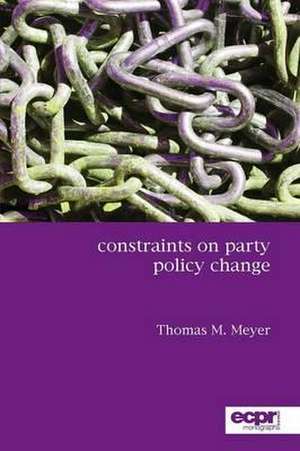Constraints on Party Policy Change: ECPR Monographs
Autor Thomas M. Meyeren Limba Engleză Paperback – 29 apr 2013 – vârsta de la 22 ani
Preț: 341.16 lei
Nou
Puncte Express: 512
Preț estimativ în valută:
65.28€ • 67.45$ • 54.31£
65.28€ • 67.45$ • 54.31£
Carte tipărită la comandă
Livrare economică 20 martie-03 aprilie
Preluare comenzi: 021 569.72.76
Specificații
ISBN-13: 9781907301490
ISBN-10: 1907301496
Pagini: 284
Dimensiuni: 156 x 234 x 15 mm
Greutate: 0.4 kg
Ediția:New.
Editura: Ecpr Press
Seria ECPR Monographs
ISBN-10: 1907301496
Pagini: 284
Dimensiuni: 156 x 234 x 15 mm
Greutate: 0.4 kg
Ediția:New.
Editura: Ecpr Press
Seria ECPR Monographs
Notă biografică
By Thomas M Meyer
Recenzii
"What contemporary political science needs most at the present time is theory development and testing, particularly against comparative evidence. This well-organised and clearly written work provides both, in generous measure. Focused on the central actors in modern democracy - political parties - it asks what prevents them changing policies radically in order to attract votes? The answer lies in the existence of rival parties, the reaction of voters: and within their own organisational structures. The book systematically develops hypotheses about how these factors act on party policy and interact with each other to block radical change. The hypotheses are checked out against the in-depth evidence on voter reactions provided by the various British Election Studies: and the 10-country 50-year observations on policy shifts provided by the Comparative Manifestos dataset. One chapter provides a balanced review of the methodological discussion surrounding these, which will be useful to other users. Overall, this book adds usefully to our knowledge or party behaviour in democracies to the development of democrative theory and to the assessment of the comparative evidence relating to it. In these ways it adds significantly to the ECPR book series as a whole and to comparative political science in general." Ian Budge Professor Emeritus of Government University of Essex "Thomas Meyer's Constraints on Party Policy Change is a much needed analysis of why political parties cannot and do not optimise their electoral appeal by adopting whatever policy position appears popular at the moment. Parties are, Meyer persuasively reminds us, policy brands built, promoted, and sustained by party activists with deep commitments not just to a name but to a brand name. Taking account of both motive and opportunity, Constraints on Party Policy Change demonstrates that parties as organisations have to maintain their brand's credibility with voters and that party leaders have to take account of the structure of party policy decision making when seeking to shift a policy position. The theoretical and analytical tasks Meyer set for himself are important to empirical democratic theory, so too are his analysis and results." Michael D. McDonald Professor of Political Science Binghamton University "This very good and very important book analyses why (and when) political parties shift their policy positions. Meyer presents innovative empirical analyses and theoretical arguments that party policy change is constrained by factors including parties' organisational structures, their governing status, their resources, their previous policy behaviour, the prestige of the party's leader, and voters' levels of political interest. By shifting his focus away from parties' static policy positions and onto parties' policy shifts, Meyer advances of understanding of parties' election strategies and the dynamics of mass-elite policy linkages. This powerful book will help to shape the study of parties and elections for years to come." James Adams Professor of Political Science University of California, Davis























